string theory
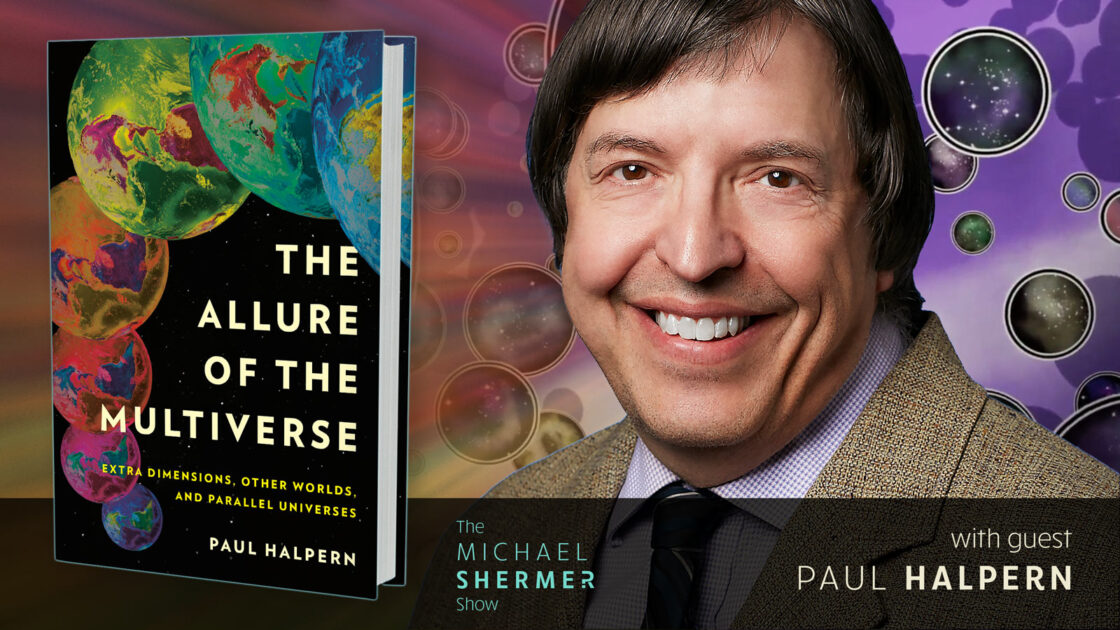
Shermer and Halpern discuss: definitions of universe and types of multiverses • Is the multiverse science, metaphysics, or faith? • theists claim the “multiverse” is just handwaving around the God answer • many worlds interpretation of quantum mechanics? • inflationary and Darwinian cosmology • infinity and eternity • multiple dimensions • string theory • cyclical universes • Big Bounce • Anthropic Principle (weak, strong, participatory) • time travel • sliding doors, contingency, and the multiverse.
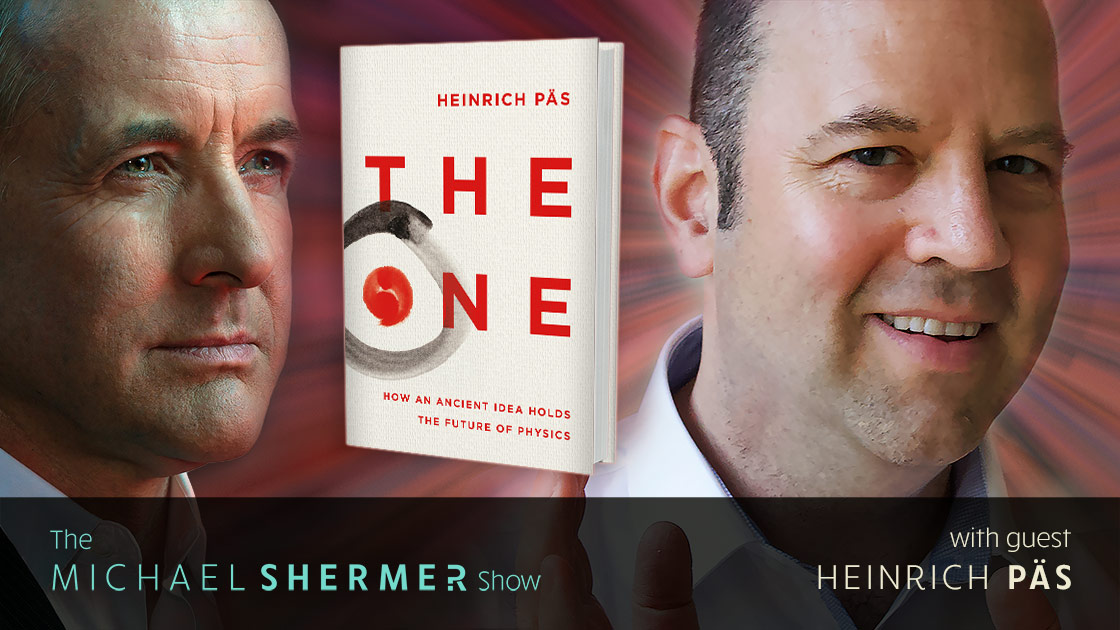
Shermer and Päs discuss: monism vs. dualism • What is time? • What is a field? • Is math all there is? Is math universal? • the double-slit experiment • superposition • metaphors in science • limitations of models and theories of reality • limitations of analogies between western physics and eastern mysticism • What banged the Big Bang? • Are we living in a matrix? • the Second Laws of Thermodynamics and directionality in nature • Model Dependent Realism • string theory, the multiverse, consciousness, the origin of the universe, and why…
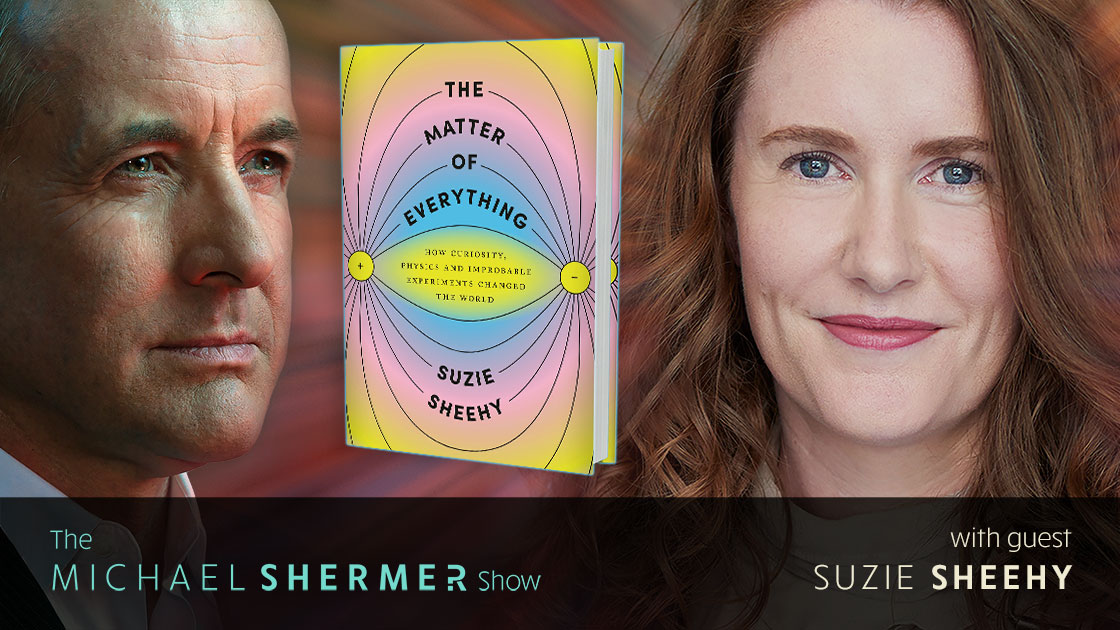
Shermer and Sheehy discuss: what it’s like being a female physicist in a mostly male field • Does science progress through falsification, confirmation, consensus, or Bayesian reasoning? • atoms, light, Higgs Boson, time, gravity, dark energy, dark matter, string theory, radioactivity • Gold Foil Experiment • cloud chambers • particle accelerators • splitting the atom • Is there a place for God in scientific epistemology? • Is math all there is? Is math universal? • other universes, dimensions, and the multiverse.

Michael Shermer speaks with quantum physicist, Jim Al-Khalili, who reveals how 8 lessons from the heart of science can help us all get the most out of our lives.
Mark W. Moffett remind us that breakthroughs in science often come about by exploring points of similarity between things that are normally seen as very different. PLUS: Michael Shermer speaks with quantum physicist, Jim Al-Khalili, who reveals how 8 lessons from the heart of science can help us all get the most out of our lives. PLUS: In SRC Report PCIS-005, we take a look at Conspiracy Theory Endorsement by Generation.
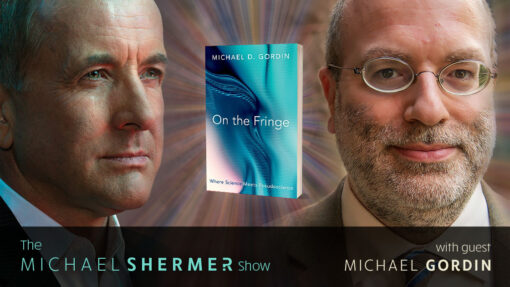
Everyone has heard of the term “pseudoscience,” typically used to describe something that looks like science, but is somehow false, misleading, or unproven. In episode 191, Michael explores with Michael Gordin the philosophical and historical attempts to address the problem of scientific demarcation.
Everyone has heard of the term “pseudoscience,” typically used to describe something that looks like science, but is somehow false, misleading, or unproven. In episode 191, Michael explores with Michael Gordin the philosophical and historical attempts to address the problem of scientific demarcation.
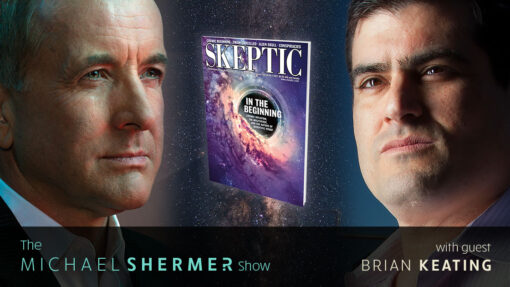
Shermer and Keating discuss: cosmology • Intelligent Design • “fine-tuned” universe • multiverse • God • Intelligent Design • laws of nature • origin of the universe • Big Bang • something rather than nothing • inflationary cosmology • quantum gravity • Steady State theory • Popperian falsification • consensus science • string theory • shape is the universe? Open, closed, or flat? • dark energy • dark matter • time and infinity.
In episode 175 of The Michael Shermer Show, Michael speaks with Brian Keating about How it All Began: Cosmic Inflation, the Multiverse, and the Nature of Scientific Proof. Plus, we present a review of Julia Galef’s book The Scout Mindset: Why Some People See Things Clearly and Others Don’t.
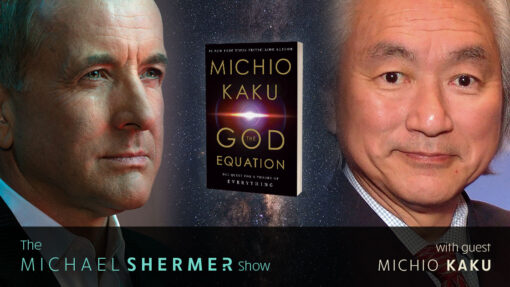
Synthesizing relativity and quantum theory would be the crowning achievement of science, a profound merging of all the forces of nature into one beautiful, magnificent equation to unlock the deepest mysteries in science. In this episode, Michael Shermer speaks with professor of theoretical physics Michio Kaku about: the Big Bang, black holes, worm holes, the multiverse, time travel, dark energy and dark matter, gravity, string theory, ETIs, meaning, and God.
Michael Shermer speaks with professor of theoretical physics Michio Kaku about The Quest for a Theory of Everything. PLUS: From now through April 10, 2021 (5 days only) all print and digital back issues Skeptic magazine are on sale for only $1.99 each!
In this week’s eSkeptic, Andrew Zak Williams reviews Lawrence Krauss’ latest book A Universe from Nothing: Why There Is Something Rather than Nothing, with an Afterword by Richard Dawkins (Free Press, 2012, ISBN-13: 978-1451624458). This review appears in the Skeptic magazine 17.2 (2012).
In this special dual lecture event, Venderbilt University astronomer David Weintraub explains how old the universe is and how we know in an enthusiastic way. Following that lecture, Dr. Shing-Tung Yau tells the story of “Calabi-Yau manifolds,” — one of the smallest things you can possibly imagine — six-dimensional geometric spaces that may be more than a trillion times smaller than an electron. They might also be one of the defining features of our universe!
WHEN AND HOW DID THE UNIVERSE BEGIN? Why are we here? Why is there something rather than nothing? What is the nature of reality? Why are the laws of nature so finely tuned as to allow for the existence of beings like ourselves? And, finally, is the apparent “grand design” of our universe evidence of a benevolent creator who set things in motion — or does science offer another explanation? Don’t miss this lecture by Leonard Mlodinow.
Our 2008 conference at Caltech, on the question of origins, featured lectures by Leonard Susskind, Paul Davies, Sean Carroll, Donald Prothero, Christof Koch, Stuart Kauffman, Kenneth Miller, Nancey Murphy, Michael Shermer, Hugh Ross, Victor Stenger, and a performance by Mr. Deity.
One hundred years ago, scientists would have said that lasers, televisions, and the atomic bomb were beyond the realm of physical possibility. In his new book, Physics of the Impossible, the renowned physicist Michio Kaku explores to what extent technologies and devices deemed equally impossible today might become commonplace in the future…
In the tradition of the bestselling The Physics of Star Trek, acclaimed science writer Jennifer Ouellette explains fundamental concepts in the physical sciences through examples culled from the hit TV shows Buffy the Vampire Slayer and its spin-off, Angel. The weird and wonderful world of the Buffyverse —where the melding of magic and science is an everyday occurrence — provides a fantastical jumping-off point for looking at complex theories of biology, chemistry, and theoretical physics…
The concept of additional spatial dimensions is as far from intuitive as any idea can be. In this lecture based on her new book, Dr. Randall employs creative analogies to explain how our universe may have many unseen dimensions…
In Parallel Worlds, world-renowned physicist and bestselling author Michio Kaku takes readers on a fascinating tour of cosmology, M-theory, and its implications for the fate of the universe. Kaku begins by describing the extraordinary advances that have transformed cosmology over the last decade, forcing scientists around the world to rethink our understanding of the birth and fate of the universe…
In this week’s eSkeptic, we announce upcoming events.















